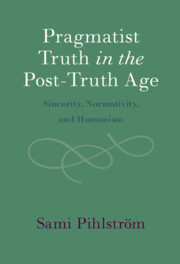Book contents
- Pragmatist Truth in the Post-Truth Age
- Pragmatist Truth in the Post-Truth Age
- Copyright page
- Epigraph
- Contents
- Acknowledgments
- Introduction
- Chapter 1 James’s Children?
- Chapter 2 Religious Truth and Pluralism from a Pragmatist Point of View
- Chapter 3 Around or through Kant?
- Chapter 4 The Will to Believe and Holistic Pragmatism
- Chapter 5 How Is Normativity Possible?
- Chapter 6 Pragmatic Agnosticism – Meaning, Truth, and Suffering
- Conclusion
- References
- Index
Chapter 3 - Around or through Kant?
Kantian Transcendental Pessimism and Jamesian Empirical Meliorism
Published online by Cambridge University Press: 14 September 2021
- Pragmatist Truth in the Post-Truth Age
- Pragmatist Truth in the Post-Truth Age
- Copyright page
- Epigraph
- Contents
- Acknowledgments
- Introduction
- Chapter 1 James’s Children?
- Chapter 2 Religious Truth and Pluralism from a Pragmatist Point of View
- Chapter 3 Around or through Kant?
- Chapter 4 The Will to Believe and Holistic Pragmatism
- Chapter 5 How Is Normativity Possible?
- Chapter 6 Pragmatic Agnosticism – Meaning, Truth, and Suffering
- Conclusion
- References
- Index
Summary
The relation between Kantian transcendental philosophy and Jamesian pragmatism is both historically and systematically crucial for the conception of pragmatism and truth developed in the book. Chapter 3 first introduces the basic idea of "transcendental pragmatism" - the integration of pragmatist, or pragmatically naturalized, and Kantian-inspired transcendental arguments identifying conditions for the possibility of things we take to be actual in our practices - and then offers a critical comparison between some of Kant's and James's key ideas, especially elaborating on their pessimistic conception of the human being and suggesting that Jamesian empirical meliorism (as distinguished from both optimism and pessimism) needs to be built upon Kantian transcendental pessimism about the limits of the human condition. Based on this development of transcendental pragmatism, the relation between ethics and religion - analogous in Kant and James - is critically considered: if religion can only be based on ethics, we will have to ask whether (ethically) legitimate religious faith inevitably remains insincere.
Keywords
- Type
- Chapter
- Information
- Pragmatist Truth in the Post-Truth AgeSincerity, Normativity, and Humanism, pp. 69 - 100Publisher: Cambridge University PressPrint publication year: 2021

